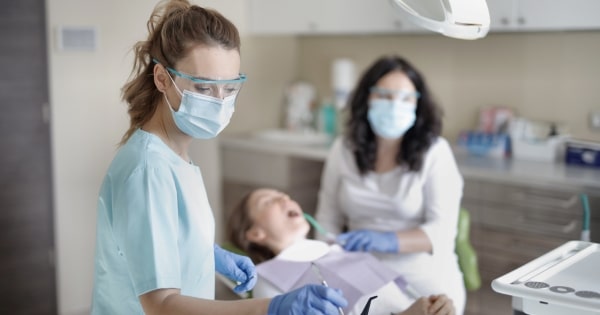
We all desire a fresh, confident smile. Sometimes, a bad breath or halitosis can be a formidable barrier to that goal. The good news is that you’re not alone in your quest for fresher breath, and there are numerous ways to tackle this issue head-on.
In this blog, we’ll explore proven methods to get rid of bad breath and maintain good oral health. Say goodbye to the embarrassment and discomfort and embrace a mouth that radiates confidence. Let’s begin with the factors responsible for making your breath smell bad.
Source: American Dental Association (ADA)
Understanding the Causes of Poor Mouth Odor
Bad breath can originate from various sources, and knowing the root causes is the first step to conquering it. Let’s delve into the primary culprits behind bad breath, hampering your image in professional and private events:
1. Poor Oral Hygiene
Maintaining good oral hygiene is fundamental to preventing bad breath. Bacteria in your mouth feed on food particles left behind after eating. In the absence of proper brushing and flossing, these bacteria release sulfur compounds, leading to an unpleasant odour. To combat this, make it a habit to brush your teeth at least twice a day, using fluoride toothpaste. Don’t forget to brush your tongue, where many odour-causing bacteria reside gently.
Flossing is equally important; it removes food particles from between your teeth that a toothbrush can’t reach. Additionally, consider using antimicrobial toothpaste to help kill odour-causing bacteria. For the right selection of products that elevate dental hygiene, visit your dentist today.
2. Dietary Habits
While we can’t avoid all pungent foods, being mindful of your diet can help. Garlic and onions, for example, contain sulfur compounds that linger in your mouth and are absorbed into your bloodstream, affecting your breath.
To minimize their impact, try incorporating parsley, which is a natural breath freshener, into your meals. Chew on it after eating such foods, or add it as a garnish. Also, consider adding more fibre-rich fruits and vegetables to your diet. They help in stimulating saliva production and cleaning your mouth.
3. Dry Mouth
Saliva is nature’s mouthwash. It not only helps in digestion but also rinses away odour-causing bacteria. When your mouth is dry, bacteria multiply rapidly. To combat this, stay hydrated by drinking plenty of water throughout the day. Chewing sugar-free gum can also stimulate saliva production. Additionally, consider using a humidifier at night if you often wake up with a dry mouth.
This simple step can help keep your mouth moist and bacteria at bay. However, dentists do recommend booking a consultation if your mouth is unable to produce adequate saliva to combat dryness.
4. Infections and Illnesses
Sometimes, bad breath is a sign of an underlying health issue. Gum disease, for instance, is a common cause of halitosis. It’s essential to maintain regular dental check-ups to address any gum problems.
Additionally, sinus infections and acid reflux can lead to bad breath. Consult your healthcare provider if you suspect these conditions might be contributing to your breath issues. Proper diagnosis and treatment of these underlying issues are crucial for long-term oral health.
5. Tobacco and Alcohol
Smoking not only stains your teeth but also leaves a lingering, unpleasant odour. The best way to eliminate this issue is to quit smoking altogether. Likewise, excessive alcohol consumption can lead to bad breath. Moderation is key. Reducing your alcohol intake can significantly improve the smell of your breath.
Seek support if you need help in quitting smoking or reducing your alcohol consumption. Your overall health will thank you for it.
6. Medications
Some medications have side effects that cause dry mouth, leading to bad breath. If you believe your medication might be the culprit, discuss your concerns with your healthcare provider. They may be able to adjust your treatment plan or recommend an alternative medication. Do not stop taking your medication without consulting an oral care professional, as this may have adverse consequences on your health.
Some Effective Strategies for Fresh Breath
Here are a few proven hacks to deal with bad mouth odour and get lasting results.
Meticulous Oral Care
Your oral hygiene routine should be thorough and consistent. Make sure to brush for at least two minutes, covering all surfaces of your teeth. Consider using an electric toothbrush, as they are often more effective in removing plaque. Flossing should be a daily ritual, and it’s equally important to reach every gap between your teeth. You can also use antimicrobial toothpaste to help kill odour-causing bacteria.
Stay Hydrated
Adequate water intake is essential for saliva production. A dry mouth is not only uncomfortable but can also exacerbate bad breath. Aim to drink at least eight glasses of water daily, and always have a bottle of water on hand to sip throughout the day. Staying hydrated not only benefits your breath but also your overall health.
Diet Modifications
As previously mentioned, garlic and onions are common culprits behind bad breath. While you don’t have to eliminate them from your diet, you can try consuming them in moderation and incorporating breath-freshening foods like parsley, apples, and carrots. These foods act as natural deodorizers for your breath and are good for your general health as well.
Mouthwash
Mouthwash can provide a temporary solution for bad breath. Opt for an alcohol-free, antimicrobial mouthwash that kills bacteria without drying out your mouth. Use it as a complement to your regular oral hygiene routine rather than a replacement for brushing and flossing. Be sure to follow the manufacturer’s recommendations for use, and don’t rely on mouthwash as the sole solution for bad breath.
Sugar-Free Gum
Chewing sugar-free gum can stimulate saliva flow and mask bad breath temporarily. It’s a handy option for freshening your breath on the go, but remember that it’s not a substitute for good oral hygiene. Chewing gum with xylitol may be particularly beneficial, as xylitol can help combat bacteria that lead to bad breath.
Tackling bad breath can significantly improve your oral health and boost your confidence. Remember that these strategies work best when used together consistently. Don’t let bad breath hold you back – embrace a fresher, more confident you! Fix an appointment with your dentist, who specializes in freshening up breath and improving oral health.
FAQs on Bad Breath/ Halitosis
Q. Can bad breath be a sign of a more serious dental issue?
Bad breath may be an early indicator of dental problems like cavities or gum disease. Regular dental check-ups help catch these issues before they worsen.
Q. Are there any natural remedies for bad breath?
Yes, natural remedies like chewing on fresh mint leaves or using baking soda as toothpaste can help neutralize odours. However, they should complement, not replace, proper oral care.
Q. Can bad breath affect my self-confidence and relationships?
Yes, persistent bad breath can impact your self-esteem and relationships. Addressing it not only improves oral health but also boosts your confidence and social interactions.
Q. What’s the connection between bad breath and smoking?
Smoking not only stains teeth but also dries out the mouth, promoting bacterial growth and bad breath. Quitting smoking is a crucial step in achieving fresher breath.
Q. How long does it take to see improvements in bad breath with proper care?
With consistent oral care and lifestyle adjustments, you can expect to see improvements in as little as a few weeks. However, individual results may vary based on the underlying causes.


